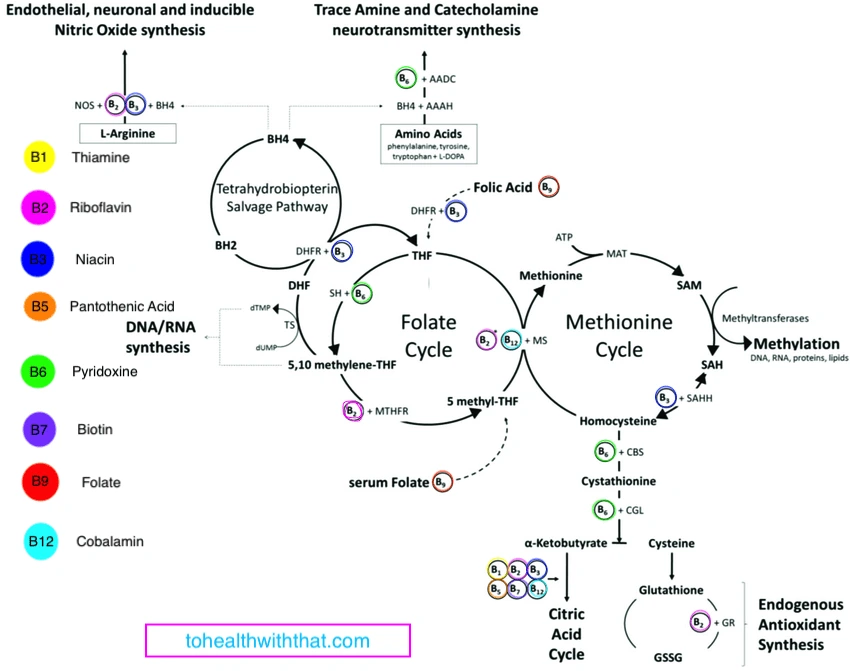The word “methylation” is tossed around on the internet like we all know what is going on here, but it’s hard to find a good explanation of what it is, what it does, or why it’s important. So let’s dive in and make some sense out of it.
What is Methylation?
Methylation is a very small, foundational chemical function in your body. It involves the moving of a methyl group, which is a carbon with three hydrogens that you can picture a lot like a Mickey Mouse head with an extra ear (shudder).
Your body has to be able to methylate things over and over again in every cell of your body. In fact it is estimated that the methylation cycle runs roughly one billion times per second in your cells, which is staggering.
Anything your body uses resources to do one billion times per second, has to be pretty pivotal. The methylation cycle is linked to the folate cycle like cogs in a machine at the pivotal MTHFR enzyme. This enzyme has to be running smoothly for the folate or methylation cycles to work normally, and it isn’t always running smoothly. There could be problems with the MTHFR enzyme for several reasons:
- MTHFR gene mutation. This includes C677T, A1298C, or compound heterozygous mutations. Also, other smaller less-well-studied variances.
- Folic acid toxicity. Folic acid, the synthetic form of folate, can become toxic when all daily sources including folic acid from food fortification reach the 1000 mcg level. This toxicity actually impairs the function of the MTHFR enzyme.
- Folate deficiency. If there isn’t enough dietary folate, then the folate and methylation cycles can’t work properly becasue there isn’t anything for them to work on.
- Riboflavin deficiency. Riboflavin is a necessary cofactor to the MTHFR enzyme, meaning if there isn’t a riboflavin molecule bonded to the enzyme, then it can’t function.
Why Methylation Matters
Your body attaches this methyl group to a variety of molecules like proteins, DNA, neurotransmitters, and toxins to change those molecules so that they become more biologically active or functional. Here are some examples of what methylation does:
- Gene Regulation: Methylation helps regulate gene expression, which means it controls which genes are turned on or off. This is essential for the proper development and functioning of cells.
- DNA Repair: Methylation is involved in repairing damaged DNA. It helps maintain the integrity of our genetic material by facilitating the repair of DNA strands that may be damaged due to various factors like exposure to environmental toxins or radiation.
- Neurotransmitter Production: Methylation is crucial for the production of neurotransmitters, which are chemicals that transmit signals between nerve cells. Proper neurotransmitter function is essential for mood regulation, cognition, and overall mental health.
- Detoxification: The body uses methylation in the detoxification process. It helps convert toxins into less harmful substances that can be eliminated from the body.
- Cellular Energy Production: Methylation is involved in the synthesis of coenzyme Q10 and carnitine, which are important for energy production within our cells.
- Immune System Function: Methylation is also involved in the regulation of the immune system, helping the body defend itself against infections and diseases.
- Building Healthy Babies: Methylation of the genetic material used in eggs and sperm is crucial to the development of a healthy, viable fetus and therefore to fertility.
- Estrogen Metabolism: Estrogen must be methylated for proper metabolic breakdown and without functioning methylation, estrogen can build up, increasing cancer and disease risk.
- Histamine Breakdown: Histamine must also be methylated in order to be eliminated, especially from the brain. Poor methylation can contribute to problems like MCAS, histamine intolerance, and severe allergies.
Methylation is Why MTHFR Matters
MTHFR gene mutations matter so much not because they impair the activation of folate, but because active folate is what makes SAMe in our body and SAMe is the primary methyl donor. That means, when your body needs to methylate something, the first place it looks to get a methyl group is from SAMe, but SAMe had to get it’s methyl group from methylated folate and you made methyl folate in your MTHFR enzyme.
So, if MTHFR isn’t working so well, you can’t activate (methylate) your folate, which means you can’t make SAMe, which means all of the things you need to methylate with SAMe, like neurotransmitters, toxins, and your DNA, can’t be methylated.
Here that is in graphic form:

How to Boost Your Methylation
Boosting methylation and taking good care of an MTHFR mutation look really similar. Here are some basic things you can do:
- Avoid folic acid.
- Add methylfolate to your supplements
- Eat foods high in natural folate like dark green leafy veggies, broccoli, asparagus, beans and pulses, and mangos.
- Make sure you’re getting enough riboflavin from diet and supplements
- Cut back on alcohol – it uses up your folate
- Watch out for folate-gobbling prescriptions like birth control pills and hormone replacement therapy (you don’t need to stop them, but you do need to get extra methyl folate to cover the extra use)
- Get moderate exercise
- Make sure you have all of the B vitamins covered to help with things like cellular energy, etc… It doesn’t help directly with methylation, but it helps you to get what you want to get out of methylation.
MTHFR is a common genetic mutation that can contribute to anxiety, depression, fatigue, chronic pain, infertility, and more serious conditions like breast implant illness, heart attack, stroke, chronic fatigue syndrome, and some types of cancer. If you know or suspect you have an MTHFR variant, schedule a free 15-minute meet-and-greet appointment with MTHFR expert Dr. Amy today.
Book Your Appointment
